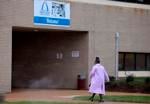ST. LOUIS — The three newly elected board members at St. Louis Public Schools will face immediate challenges, from stabilizing finances to restoring trust, after they are sworn in Tuesday.
Karen Collins-Adams, AJ Foster and Brian Marston beat out incumbent school board President Antionette “Toni” Cousins and seven other candidates in the election two weeks ago. City voters opted for a new direction for the district, which had a tumultuous year and stands to lose full accreditation in the near future based on academics and financial standing.
“There is a sense of urgency to advocate and push for what our voters were asking for throughout this campaign,” Foster said. “They’re expecting transparency and accountability for all leadership. One of my biggest priorities is trying to find out where we stand financially.”
People are also reading…
The school district has yet to submit its 2023-24 audit to the state; it was due Dec. 31. The delay will cost the district a percentage point on its 2024-25 performance report, which is used for accreditation decisions.
This year, SLPS has a projected operating deficit of $35 million and a fund balance of around $200 million, although specific numbers have been held up by the late audit.
“There is a management problem here in that things that are must-do deliverables are not getting done,” Marston said. “If we could just get those basics in place, that would be an improvement.”
As enrollment in SLPS continues to drop, the school board is expected to vote on closing school buildings by fall 2026. There are 16,212 students in kindergarten through 12th grade, a decline of more than 15% since 2020.
The board turnover also comes at a time of low morale in the district following the firing of former Superintendent Keisha Scarlett and the promotion of deputy Millicent Borishade as her replacement.
In a staff survey collected in February, five out of 61 school principals said the working environment is overall positive, and only 19% of teachers responded favorably to the statement, “I feel valued by SLPS.”
Collins-Adams, who is married to former SLPS Superintendent Kelvin Adams, said the new board members need to bring solutions for rebuilding the district.
“What’s our future going to look like? How do we start building a district improvement plan to move us forward?” she said.
Scarlett was fired last year for questionable hiring and spending practices during her one-year tenure, which included awarding $3 million in salaries and consulting contracts to friends and former colleagues.
Borishade came from the Seattle area with Scarlett in July 2023 and now makes the same $268,000 annual salary as superintendent.
Cousins, the outgoing board president, signed Borishade’s three-year contract on March 24, two weeks before the election. The contract states the board can fire Borishade with cause, potentially prompting an appeal, or without cause and pay out of the remainder of her salary through June 2028.
After Tuesday’s swearing-in, only two of seven members will remain from the board in January, when it voted to promote Borishade to superintendent.
During their campaigns, Collins-Adams, Foster and Marston all said they would have preferred a traditional search process, including community input, for Scarlett’s replacement.
As the superintendent’s newest bosses, the incoming members say they plan to build relationships with Borishade and not make any immediate decisions about her future.
“The priority for me is to get to know what her priorities and goals are, and then setting up a clear system of checks and balances,” Foster said.
A push to delay cuts
Dozens of staff members plan to pressure the board to delay cuts to the district’s three schools for new immigrant students that would limit the program from two years to one. The move is expected to displace more than 300 students by the fall.
Nearly 900 people have signed a that states, “A one-year model may not provide sufficient time for students to acquire English proficiency and meet academic benchmarks, leading to increased dropout rates and diminished long-term educational outcomes.”
Staff members at Nahed Chapman New American Academy said they don’t know if or where they will have jobs next year. Families feel blindsided by the decision after being promised two years in the newcomer program, teachers said.
“It was a hard conversation. They’ve already been through so much trauma and upheaval, the least we can do is give them two years of stability,” said one teacher, who requested anonymity for fear of losing her job.
A transition team includes teachers who have not been paid for the off-hours work reassigning students and notifying families. Several staff members have been called in for disciplinary meetings after asking questions or speaking at school board meetings.
“They’re not open to any critical feedback and people are being disciplined and targeted,” the teacher said.
Foster, one of the newly elected board members, said she’s “confident that a majority of the board would be willing to revisit the decision” to cut the program.
Collins-Adams added that “it’s difficult to understand” the changes in light of anti-immigration sentiment from the federal government.
“I need to get into it a little deeper to understand why we had the change now rather than getting more input from the community,” she said. “(The decision) needs patience and time ... being able to provide educational opportunities that will meet their needs is important.”
Students at the Nahed Chapman New American Academy are immigrants and refugees who learn English along with other subjects at the school. Students Muhammad Alahmad, Florence Uwera and Kiza Ibrahim share their experiences.














